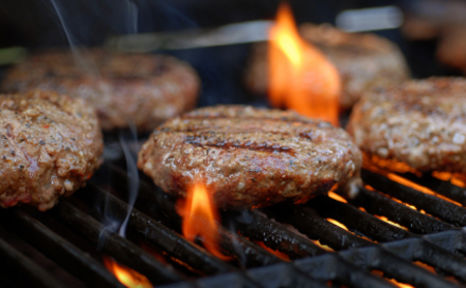

Food Borne Illness Can Turn Your BBQ into an ER Trip

As the mercury rises and the breeze gets balmy, it’s natural to look to your grill or BBQs to prepare dinner. Grilling helps keep the heat out of the kitchen and gives you the chance to connect with nature. But if you have an autoimmune disease like multiple sclerosis, rheumatoid arthritis of Sjögren’s syndrome, backyard bacteria could put a damper on the festive feel of a cookout because people with autoimmune diseases are more susceptible to falling ill as a result of food bacteria than others.
Darryl Holliday, PhD., a chef and food scientist in Baton Rouge, La., says an autoimmune disease makes someone more susceptible to food borne illnesses because the immune system is weakened. And as it tries to fight the disease and accompanying inflammation in the body, the opportunity for a food borne illness is increased due to the decrease in standing defenses for foreign bacteria.
But that doesn’t mean you can’t enjoy a BBQ or eat grilled food. You just need to know these secrets to avoid bacteria that might be on your food so a summer cookout doesn’t turn into a trip to the ER or the doctor’s office.
It seems obvious, but washing your hands before and after handling any meat, fish or poultry is a step that’s often skipped. But since bacteria like salmonella can be present on meats, not washing your hands after touching raw meats can transfer bacteria to other foods, cutting surfaces, utensils, etc.
Instead of eyeing a piece of meat, chicken or fish to guess it’s done, Holliday suggests using a digital thermometer to ensure the food is cooked to the proper temperature.
The main concerns of backyard barbecue food borne illness are salmonella and E. coli and listeria. But the high temperature needed to properly cook meat and poultry stunts the development of these bacteria.
“Salmonella and E. coli can both be prevented by proper handling and making sure that foods are cooked until their internal temperature reaches the recommended temperature depending on the food,” says Holliday. “For ground beef and chicken this means cooking to an internal temperature of 165 °F.”
When you’re grilling for the whole family or neighborhood, it’s tempting to save a few bucks and opt for cheaper cuts of meat. But that decision could leave you feeling ill for days later. Inexpensive meats are made with more fats, which can increase inflammation in the body and trigger symptoms of autoimmune disease.
So skip the ground-chuck mystery meat on sale for $2.99 a pound at your grocery store and upgrade to grass-fed beef. “Cows that grazed on grass produce meat that’s leaner and higher in essential fatty acids, as well as numerous vitamins and minerals,” says JJ Virgin, a certified nutrition specialist and author of NY Times bestseller THE VIRGIN DIET. Those nutrients are helpful to prevent inflammation in the body associated with autoimmune diseases so you’re less likely to feel achy, sluggish or sick the day after a BBQ.
Holliday says salmonella and E.coli are stunted in cool temperature. “That’s why meat, chicken and fish should be kept cold until you’re ready to put them on the grill,” he says. Store them (even while they’re marinating) in the refrigerator or a cooler that’s at least 40 °F until you’re ready to place them on the grill.
Likewise, once food is cooked, make sure to keep it at 140oF and covered to prevent bacteria from developing before you eat.
Copyright © www.orthopaedics.win Bone Health All Rights Reserved